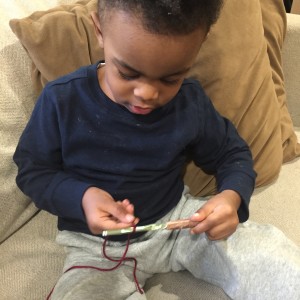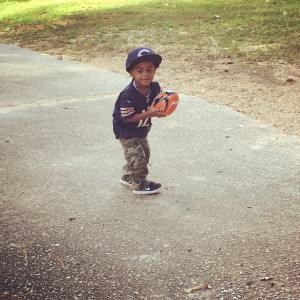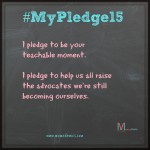This post contains affiliate links. I receive compensation when you purchase through my link.
When I first found out I was having a boy, I was very vocal about only receiving gender neutral items. Part of it was me being frugal and considering the possibility of future children, but a large part was me not wanting my kid to come home to sports and NASCAR central. I did not want his first word to be “football” and for him to shun stuffed animals. I did not want gender norms to dictate his life before he even opened his eyes for the first time. At the time I am sure people thought I was just hormonal and freaked out about having a boy, which is certainly a reasonable assumption. Looking back I can see that my prior research on feminism and patriarchy were subconsciously permeating my choices.

“Feminists are made, not born. One does not become an advocate of feminist politics simply by having the privilege of having been born female. Like all political positions, one becomes a believer in feminist politics through choice and action.” ~bell hooks
If you have been reading Mamademics for a while, you know that I took my doctoral exams during the spring of 2013 shortly after Sesame’s first birthday. Comprehensive exams vary by departments and programs, but my program required coming up with an extensive reading list around my research interests. In my case, this meant black feminism, feminist rhetoric, feminist pedagogy, composition pedagogy, hush harbor rhetoric, and writing center studies. You do the reading and work with your committee to come up with research questions and then spend seven days answering the questions they chose in 10-15 page essays. It’s lots of fun… not really. It was not until I started really delving into my comp exam reading list that it all made sense. My subconscious told me that these things were wrong, and now it was up to me to turn this into conscious parenting choices. But, how?
1. You are not entitled to a woman’s body

I’m sure this seems extreme, but when I think about teaching him to respect women and their bodies this seems like the perfect first lesson. (Ha while writing this he just came over and said “sit in mommy lap, pease?”)
2. No spanking…
Another thing that we discussed briefly during my pregnancy was our desire not to spank our son. We were both spanked as children and while we understand why our parents chose this method it’s not something we wanted to continue. So, how is that feminist? Well what many people don’t know is that the feminist movement also called attention to the fact that children are often seen as the “property” of parents, which gives adults the “right” to do what they want to them. While studying for my exams I came across two very important passages from bell hooks that solidified my decision on the subject.
The first is taken from Feminism is for Everybody: Passionate Politics
Adult violence against children is a norm in our society. Problematically, for the most part feminist thinkers have never wanted to call attention to the reality that women are often the primary culprits in everyday violence against children simply because they are the primary parental caregivers. While it was crucial and revolutionary that feminist movement called attention to the fact that male domination in the home often creates an autocracy where men sexually abused children, the fact is that masses of children are daily abused verbally and physically by women and men. (76)
The second is taken from Talking Back: Thinking Feminist, Thinking Black
Children who are the victims of physical abuse–whether one beating or repeated beatings, one violent push or several–whose wounds are inflicted by a loved one, experience an extreme sense of dislocation. The world one has most intimately known, in which one felt relatively safe and secure, has collapsed. Another world has come into being, one filled with terrors, where it is difficult to distinguish between a safe situation and a dangerous one, a gesture of love, and a violent, uncaring gesture. (86)
Both of these texts delve deeper into the ways in which ending the abuse of children help the feminist movement, but I chose these two passages because they were ones that gave me an “aha” moment. I realized that I could not fight to end patriarchy without acknowledging the ways in which women use it as well. How can I teach my son that he is not allowed to use physical force to exert his dominance if I use physical force to exert my dominance when he is a child? Do not get me wrong this is a struggle because spanking is what I know. I’m the older sibling, so I spanked my younger siblings when they didn’t listen to me, but just because you’ve faltered it doesn’t mean you can’t change.
3. Breaking down patriarchy and redefining masculinity
People often mistake the feminist movement as a “movement against men” and that we’re blaming them for all the problems women face. We are not blaming men, but we are saying that men benefit from a system of “patriarchy, sexism, and male domination.” Of course all men do not subscribe to these beliefs, but that does not mean they do not reap the benefits of the privileges that come with being born male. This also means that he will be held to a standard that he may not fit. True discussions on patriarchy and masculinity can not happen with a toddler, but actions can.
Sesame is growing up in a home where he sees both of his parents cook and clean (although Mr. S cleans more than I do). We are making a conscious effort to truly be partners, so that our son will understand that both people maintain the household. Part of doing this also means having to remind my husband when he says something that comes from a place of privilege and not in a condescending manner, but in a “we need to work on this together” way. It also does not mean I’m perfect because I still have to work on my own gender role expectations as well. For example, not taking on all the nurturing activities simply because I’m the mom. Reminding myself that it’s okay if I’m just too tired to get up in the middle of the night and asking my husband to pick up some of the slack.


How does feminism factor into your parenting choices?
Interested in learning more about how to add feminist principles to your parenting? Check out Raising an Advocate.








